
Publisher:
Bonnie King
CONTACT:
Newsroom@Salem-news.com
Advertising:
Adsales@Salem-news.com

~Truth~
~Justice~
~Peace~
TJP
Dec-05-2013 18:11

 TweetFollow @OregonNews
TweetFollow @OregonNews
Just in Time for the Semi-Centennial Kennedy Debate...
Perfect Argument and Another Grassy Knoll: The Rape of Nanking
Bill Annett Salem-News.com
It is difficult to get the news from poems yet men die miserably every day for lack of what is found there. -William Carlos Williams
DISTURBING GRAPHIC PHOTOS
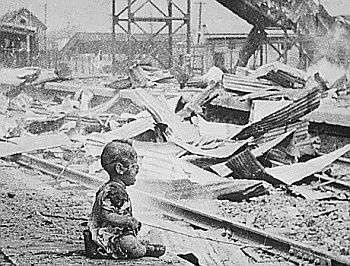 nanking-massacre.com |
(DAYTONA BEACH) -
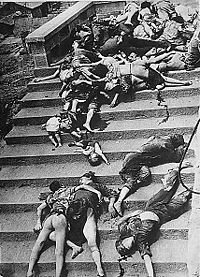 |
Another perfect storm of an altercation has been taking place for more than 65 years, over the death of the cities of Hiroshima and Nagasaki, and with them more than 200,000 people.
There is on the one hand the familiar recitation of what critics call the American propaganda version - in brief, that Harry Truman was armed with his small-town Missouri compassion when he rendered that awesome decision (and this was really awesome, as distinct from the contemporary despoiling of that powerful A-word by describing anything from a rock band's set list to a Hollywood bosom).
In that choice, so goes the affirmative side's catechism, Truman perhaps saved 250,000 G.I. lives and half a million Japanese civilians and military, given that noble culture's propensity for resistance rather than dishonor, amounting to the almost national pastime of seppukku, as common as our court martial, golden parachute or little pink slip. In a word, it was necessary.
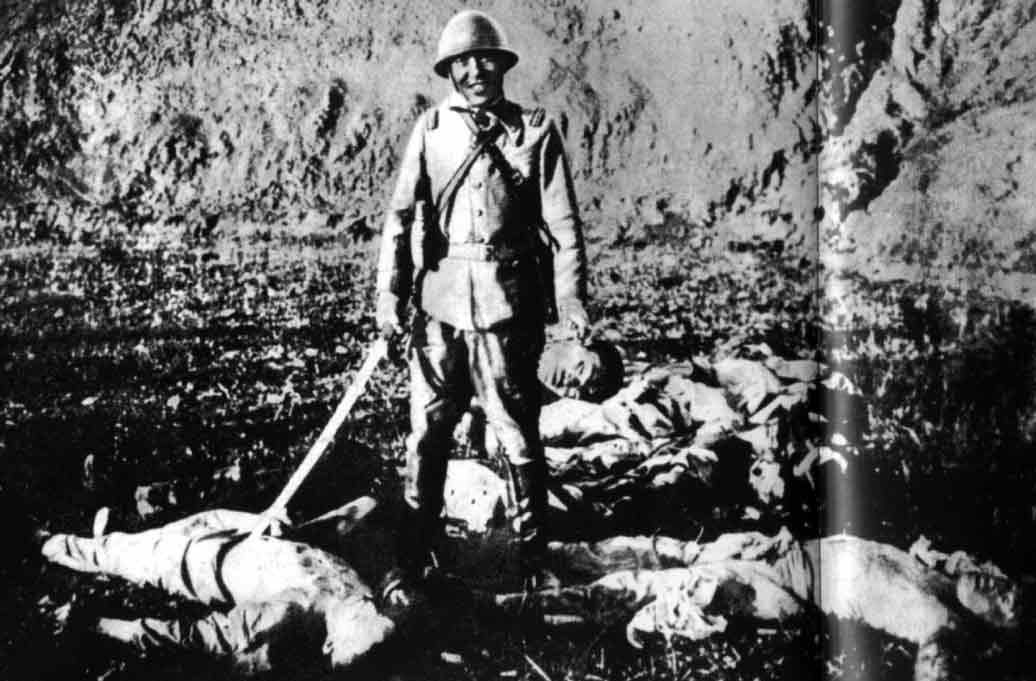 |
The negative voice in the controversy avers that nothing can excuse the horror of the outcome, and that in fact, Truman turned a blind eye to the existence of earnest Japanese emissaries who, hat-in-hand, were suing for peace - with all the sincerity of those earlier courtiers who engaged Cordell Hull in peaceful conflab even as 600 Mitsubishi products were winging their leaflet-bearing way toward Oahu. In a word, it wasn't necessary.
Take your pick - I happen to think that both sides are a little teary-eyed, having been influenced by the onion effect of watching seven decades of faded news footage and Walter Kronkite.
Instead of clinging to this Texas book-repository text, I prefer to retreat to the grassy knoll of naming an issue nobody ever talks about - and never did, much. Nanking, the Chinese city that in 1937 was obliterated not by bombs but by a rapacious army representing that same gentle Asiatic culture of silk, tea, bamboo and haiku poetry. They were not only encouraged by - but mandated and ordered by - Japan's hierarchy right up to the Emperor and the military high command. Three hundred thousand people were erased over the course of three or four months of continual torture, rape and murder, not by the momentary madness of one man pulling a bomb-release lever, but by a studied strategy born of centuries of jealousy and hatred of one nation over another.
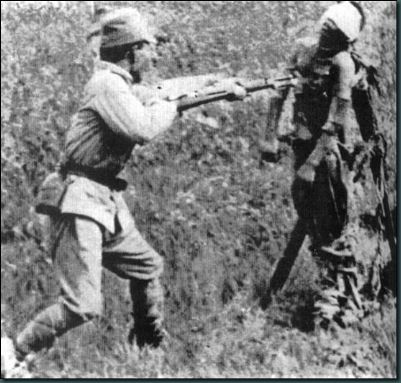 |
Perhaps that is explained by our continuous desensitization since 1945 to the word and the concept of "holocaust," because of the six million Jews killed by Nazi Germany, the rivaling genocide in Kosovo and Rwanda, and in fact our own carefully submerged domestic variety in indigenous North America. Perhaps the mass rape and murder of an even larger city's people doesn't have the news-cycle appeal, the mushroom-cloud fixation that we bring to our regular annual lugubrious memorial rite, through demonstrations, editorials and universal blubbering over the same race.
In doing so, we ignore that even greater Chinese horror (because of its deliberate and sustained inhumanity). And, incidentally, while we parade our sorrow for the loss of two Japanese cities with all the regularity of Hallowe'en, the unimaginable horror of Nanjing (the modern accepted spelling) has never been officially acknowledged, mush less apologized for, by that storied gentle nation most of us know only as concocter of tasty sushi and producer of exquisitely imitative automobiles.
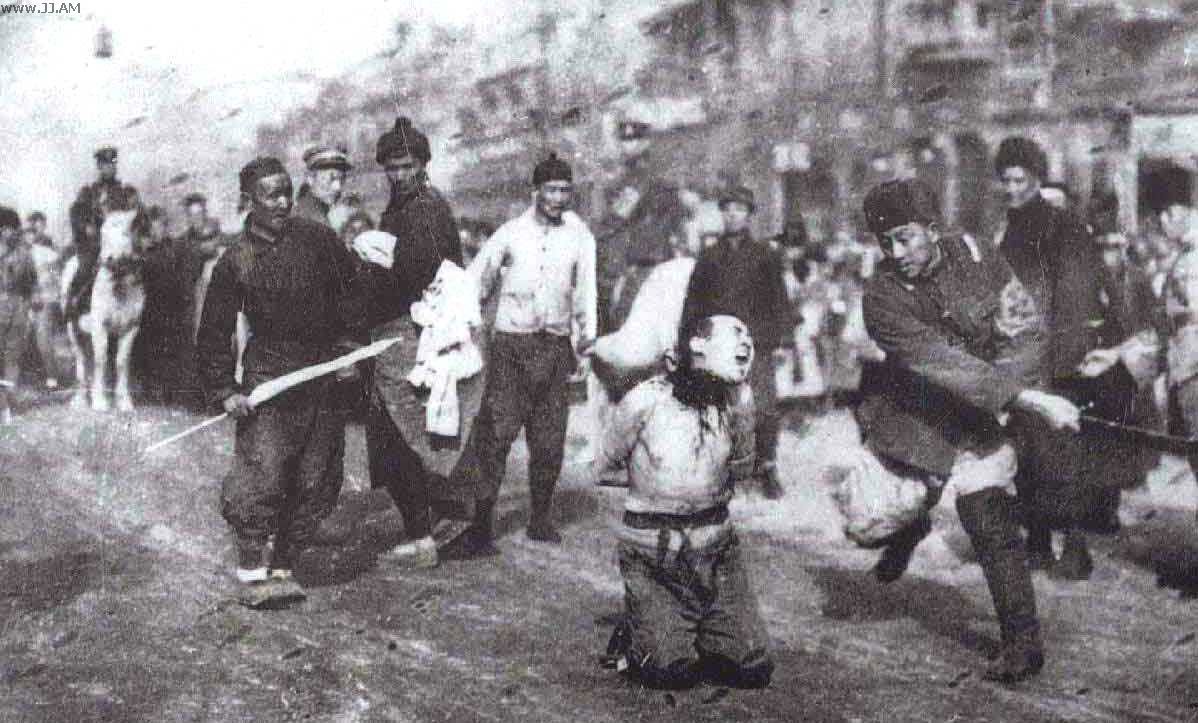 |
There has, of course, been controversy over Chang's book, by academics and popular journalists alike. She has been accused of being one-sided, lacking in empirical fact and detail and even - among Japanese academics - outright distortion and exaggeration. The fact is that Chang devoted years of patient research, largely in the city of Nanking itself, uncovering the existence of the diaries of John Rabe and Minnie Vautrin, both of whom figured prominently in a designated area known as the Nanking "Safety Zone" that protected some Chinese civilians during the massacre. Vautrin alone was credited with the saving of more than 10,000 women and children.
Chang mentioned in the book's introduction that, early in her approach to the subject, she was seized with "a panic that this terrifying disrespect for death and dying, this reversion in human social evolution, would be reduced to a footnote of history, treated like a harmless glitch in a computer program that might or might not again cause a problem, unless someone forced the world to remember it."
And an interesting commentary on her immersion in the subject is that Chang ended by taking her own life, as did Minnie Vautrin, haunted by a lifetime of reliving the horror of Nanking.
Ironically, the other diary mentioned was that of John Rabe, actually a member of a German Nazi Party movement in Nanking, who was instrumental in setting up the Safety Zone already mentioned. To paraphrase the common expression, "my enemy is the enemy of my enemy." Chang referred to him as "The Oskar Schindler of Nanking," after the hero of "Schindler's List."
The book depicted in detail the killing, torture, and rape that occurred during the Nanking Massacre. Chang listed and described the kinds of torture that were visited upon the residents, including live burials, mutilations, and death "by dogs." Based on the testimony of survivor of the massacre, Chang described "killing contests," whereby, like a weird computer game gone amok, soldiers would determine who killed the most people in the shortest time and actually kept score.
 |
Concerning the sexual atrocity that occurred during the massacre, Chang wrote that "certainly it was one of the greatest mass rapes in world history, estimating that the number of women raped ranged from 20,000 to as many as 80,000, with all classes not being spared, including Buddhst nuns, pregnant women and young girls. It was endemic and occurred continuously in all locations and at all hours. Chinese men were sodomized and forced to commit incest on their daughters, sisters and mothers.
Death toll figures by different sources become irrelevant and spurious. Chinese mililtary specialist Liu Fang suggested 430,000, officials at the Nanking Massacre Memorial Hall indicated 300,000, the International Military Tribunal For The Far East judges concluded that more than 260,000 people were killed and Japanese historian Fujiwara Akira approximated a modest 200,000. The Chinese Military, given that they were forced to perform the burials, are perhaps the most reliable. Not that it makes much difference.
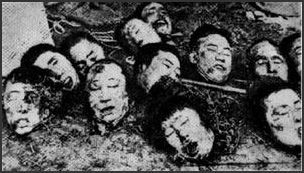 |
But research by historian Sun Zhaiwei of the Jiangsu Academy of Social Sciences, in his 1990 paper, The Nanking Massacre and the Nanking Population, estimated the total number of people killed at 377,400. Using Chinese burial records, he calculated that the number of dead also included 150,000 given by the Japanese Imperial Army, in a confessional report about the Japanese army's disposal efforts of dead bodies.
Chang in fact cited a message that Japan's Foreign Minister, Koki Hirota, relayed to his contacts in Washington in the first month of the massacre on January 17, 1938. The message acknowledged that "not less than three hundred thousand Chinese civilians [were] slaughtered, many cases in cold blood."
The Atlantic Monthly described Chang's book as "a crushing indictment of the Japanese army's behavior," while the Philadelphia Inquirer called it a "compelling account of a horrendous episode that, until recently, has been largely forgotten," and according to William C. Kirby Professor of History at Harvard, Chang "shows more clearly than any previous account connections between the slaughter in Europe and in Asia of millions of innocents during World War II." Beatrice S. Bartlett, Emeritus Professor at Yale University wrote, "Iris Chang's research on the Nanking holocaust yields a new and expanded telling of this World War II atrocity and reflects thorough research."
Like all perfect arguments, this one can - and will be - argued forever. But Canadians have direct experience with Japanese atrocity and the avuncular refusal of the Japanes nation to acknowledge, much less apologize for, the inhumanity of the past. Such has been the case with representations that have been made to seek acknowledgment for the Hong Kong Death March, which wiped out the Canadian Winnipeg Rifles Regiment.
And few Americans need to be reminded of Luzon and its Death March.
Counter rebuttals, anyone? It is after all a perfect argument.
 Bill Annett grew up a writing brat; his father, Ross Annett, at a time when Scott Fitzgerald and P.G. Wodehouse were regular contributors, wrote the longest series of short stories in the Saturday Evening Post's history, with the sole exception of the unsinkable Tugboat Annie.
Bill Annett grew up a writing brat; his father, Ross Annett, at a time when Scott Fitzgerald and P.G. Wodehouse were regular contributors, wrote the longest series of short stories in the Saturday Evening Post's history, with the sole exception of the unsinkable Tugboat Annie.
At 18, Bill's first short story was included in the anthology “Canadian Short Stories.” Alarmed, his father enrolled Bill in law school in Manitoba to ensure his going straight. For a time, it worked, although Bill did an arabesque into an English major, followed, logically, by corporation finance, investment banking and business administration at NYU and the Wharton School. He added G.I. education in the Army's CID at Fort Dix, New Jersey during the Korean altercation.
He also contributed to The American Banker and Venture in New York, INC. in Boston, the International Mining Journal in London, Hong Kong Business, Financial Times and Financial Post in Toronto.
Bill has written six books, including a page-turner on mutual funds, a send-up on the securities industry, three corporate histories and a novel, the latter no doubt inspired by his current occupation in Daytona Beach as a law-abiding beach comber.
You can write to Bill Annett at this address: bilko23@gmail.com
Articles for December 4, 2013 | Articles for December 5, 2013 | Articles for December 6, 2013
Salem-News.com:





Terms of Service | Privacy Policy
All comments and messages are approved by people and self promotional links or unacceptable comments are denied.
k May 24, 2016 12:37 pm (Pacific time)
One of the photo on this page comes from anti-Japanese movie. Anyway, Japanese cannot believe pictures of unknown origin. Rape of Nangking, how interesting and atractive it is.
S. December 6, 2014 7:40 pm (Pacific time)
Same war, different page. While not murdering them, nobody seems to want to talk about the mass tapings that occurred to the German women by US troops. It, like the Japanese, Russians and many others (and certainly over many other wars) has been largely ignored and swept under the rug. Granted, while US and Russian (and others) troops were angels compared tothe Japanese, after learning about this and doing research (not my generation), I have a hard time looking at my elders and wondering if, they too, were a part of this horror and have burried it deep and just gone on with their lives like it never happened. Sometimes I think it would have been kinder to have kept the military at home and just nuked Japan and Germany, that it would have been a kinder, more gentle way to leave a black (or red) stain on humanity for history to look back on...
Joseph Bowen March 24, 2014 11:16 am (Pacific time)
"my enemy is the enemy of my enemy." As stated this argument would mean that you allies are also you enemy.. which makes no sense...
the premise fails December 5, 2013 7:58 pm (Pacific time)
"both sides of the debate there is a reasoned, plausible case to be made, and both arguments are clear, supportable and - regrettably - simplistic. Like most arguments,"
why rebut, you proved the point December 5, 2013 7:33 pm (Pacific time)
Through the AGES, winning the hearts and minds of MEN so as to create a willing-warrior class (be it temporary AT TIMES) IS AN ESTABLISHED pattern of manipulation of misdirected reason and passion to incite to violence against everything in its path. THE JUSTIFICATIONS SPAN THE GAMUT. Spoils to the VICTOR (greed and power) are always at play. As to intentional warfare, it has always been a RACKET FOR THE MOST PART.
[Return to Top]Violence IS human animal-behavior, both ancient and modern, and will continue unabated as long as testosterone and propaganda stir the male gender to war upon others to fulfill their NEEDS and DESIRES.
WAY BEFORE THE MODERN ERA, armed and armored citizen-soldiers in Greece were primarily recruited/conscripted from the middle classes. Conscription FROM THE MIDDLE CLASSES (of nearly every society with a laborer class) was a norm thousands of years ago, and now.
Human Atrocities will never end at the Hands of Warriors under Leadership of Zealots and the self-fulfilling oaths to every dogma and precept imaginable will perpetuate an ever evolving state of violence, only perhaps more justified by its rhetoric and sophistication of weaponry (including genetic engineering) in our present times; as women are socialized and "CULTURALIZED" to accept this DESTRUCTION at the hands of MEN as INEVITABLE and even HONORABLE..
©2026 Salem-News.com. All opinions expressed in this article are those of the author and do not necessarily reflect those of Salem-News.com.